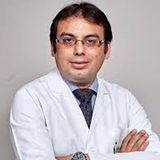we offer you a complete range of surgical and non-surgical options from major hospitals in India
At Al-Afiya Medi Tour, we offer you a complete range of surgical and non-surgical options from major hospitals in India, wherein we believe in offering our patients the highest level of medical care and medical expertise at prices that provide the best value for money to the patients. India as being one of the top medical tourism countries boasts some of the worlds leading cardiologists, neurosurgeons, ophthalmologists, physiotherapists, and weight loss/obesity specialists, and doctors of many other specializations. We provide best in class medical services at approximately ten times less prices than the USA.
Our team consists of highly qualified and immensely experienced professionals who are there for you 24×7 and provide complete end-to-end assistance related to all the medical requirements and emergencies. Starting from providing treatment specific quotes from best of hospitals/ doctors, making Visa arrangements, arranging for accommodation while in India, constant interaction with doctor / hospital during treatment, and keeping in constant touch for post treatment feedback.
Al-Afiya has partnered with some of the top-notch hospitals like Fortis, Medanta, Apollo, Manipal etc. which makes our capabilities wide, and provides patients a number of options to choose from, for their treatment at prices which provides you value for money.

A bone marrow transplant is a process for replacing the damaged or the diseased bone marrow, which is a spongy material present inside the bones where the human body makes and keeps the blood cells. It is a kind of bone marrow treatment in India.
The blood cells start as very young cells, known as hematopoietic stem cells. When they mature, they travel out from the bone marrow into your blood. In other words, a bone marrow transplant is also known as a stem cell transplant.
When a bone marrow is damaged, it produced very few blood cells that are not enough for your immune system. Therefore, a bone marrow transplant can help in curing specific diseases or some cancer. However, it also implies that the recovery process will be long, and there is a risk of some side effects. Your doctor talks to you about all pros and cons before transplantation.
Know the reasons why bone marrow transplant in India is done?
Bone marrow in human being consist of the hematopoietic stem cells which grow to becomes
With a bone marrow transplantation
In simple words, the primary goal of a bone marrow transplantation is curing several diseases and kinds of cancer. However, when the dose of radiation required to cure cancer is very high, the person's bone marrow stem cells get destroyed permanently, a bone marrow transplant in India is required.
All the risks and the advantages should be appropriately measured in a thorough discussion with your doctor and your specialists before the whole process.
Some diseases can benefit from a bone marrow transplant in India.
But not all patients experience diseases in the same manner, and bone marrow treatment might not be suitable for everyone who is suffering from such conditions.
What is a different type of bone marrow transplantations?
There are mainly two kinds of bone marrow transplantation.
When the donor is an identical sibling whose kind of tissues is the same as yours, it is known as syngeneic transplantation. Doctors can also utilize the stem cells from the blood present in the newborn's umbilical cord.
How to prepare for bone marrow transplantation?
Your health care provider will decide whether or not a bone marrow transplantation will work for you or not. They will conduct a physical exam and other tests to know about your blood and how perfectly your heart, lungs, liver and other organs will work.
If transplantation is a good option, they will talk to you about what kind of process you need to have and give you medicine. It will stay even after your treatment.
Collection of the cells for autologous bone marrow transplant India
Your doctor will use a long needle to take out the stem cells from the bone marrow present in the hip bone. It is usually carried out in the operation room by putting the person under general anesthesia, which means you are sleeping and you will not feel anything. The process will take about 1 or 2 hours. You can go home either that day or the following day. However, you might feel a sore and some weakness for few days after stem cell collection.
It is also possible to take cells from the blood directly with a process known as apheresis. First, you will need to take a drug known as filgrastim that triggers the bone marrow to make and then release many stem cells. Then your healthcare provider will take blood from your vein present in your arm and then run it through one machine that helps in separating the stem cells. The other cells travel back to the bloodstream. The whole procedure Apheresis is one of the outpatient processes, which means you will not have to stay in the hospital. It will take 2-4 hours in whole.
Collection of cells for allogeneic bone marrow transplantation: Your doctor will make a match of yours with someone having a similar kind of protein on their white blood cells, known as human leukocyte antigen. The type of HLA is something that will run in your family.
Whether the donor is a relative or any stranger, the donor will have to go through a similar process for collecting the stem cells. For example, when parents select to collect cells from an infant's umbilical cord, it is collected after birth when the cord is clamped and cut.
Conditioning: The process starts with conditioning. It involves a high dose of chemotherapy which might be radiation for about 10 days. It is different for everybody and is usually based on the overall health, and the condition is being treated.
Conditioning helps in making room for the new cells to start growing in the bone marrow. It also helps in briefly weakening the immune system to keep your body fighting the new cells. Some of the side effects of conditioning are
After some days of resting, you will receive the new blood cells through the central venous catheter. You will probably awake for this, but it will not hurt.
When the new cells start reaching your bone marrow, they will begin growing into red and white blood cells and platelets. This process is known as engraftment and will take around 2-4 weeks.
How to match the donor and the recipient?
Matching the donor and recipient mainly involves typing of human leukocyte antigen tissue. The antigens present on the surface of the individual white blood cells helps in determining the genetic makeup of the person's immune system. There are at least 100 HLA antigens, but it is also believed there are also few significant antigens that help in determining whether a donor and the recipient match or not. The others are often considered minor, and their effect on successful transplantation is not defined well.
The medical field's whole research team is investigating the role of antigens in the entire process of bone marrows transplantations. More the antigens match better is the engraftment of donated marrow.
Stem cell engraftment happens when the donated cells make their way to the bone marrow and start making new blood cells.
Most of the genes that help in coding for the immune system of the human being are present in one chromosome. As because we have two of such chromosome, where one we receive from each parent, s full sibling of a patient in need of a transplant has a 1 in 4 chance of having getting the same set of chromosomes and becomes a complete match for transplantation.
Who are in the team of bone marrow transplantation?
The group of specialists involved in the patient care having the transplantation is mainly referred to as the transplantation team. This is because each individual work together to give their best for conducting successful transplantation.
The whole team consist of
How well you tolerate the specific medicines, therapies and processes?
Recovery from bone marrow transplant
The whole recovery process is not the same for everyone, but you have to spend few weeks in the hospital. Your immunity will be weak, so you will have to take medicines for preventing infections. You might also need blood transfusions.
For the first few weeks, your doctors will test your blood often to check for engraftment. They might also take a small sample of your bone marrow for this.
Cost of bone marrow transplant in India
Bone marrow transplantation cost in India ranges from 15.00.000 to 40, 00,000. The final price depends on which bone marrow transplant India process has been recommended. The two types are Autologous and allogeneic bone marrow transplantation, are the two common types of transplantation that are prescribed for treating blood cancers or blood disorders.
The bone marrow transplantation cost in India for treating thalassemia ranges from Rs.15 lakhs to 30 lakhs.
If you are planning to do bone marrow transplantation in India, plan your bone marrow transplantation with the Al Afiya Medi tour, where you get access to the best quality care and services. Moreover, you get full visa support.
1. What is the significant difference between bone marrow and bone marrow transplant?
Bone marrow is a kind of spongy tissue present inside your bones that helps form blood cells. Bone marrow transplant is a process of replacing stem cells. The new stem cells help in generating healthy blood cells.
2. What are the different kinds of bone marrow transplantation?
There are two kinds of bone marrow transplantation. They are autologous bone marrow transplantation and allogeneic bone marrow transplantation.
3. How to know if bone marrow transplantation is a good treatment option for me or not?
Well! This depends on the kind of disease and the overall health. Your healthcare provider will guide you better about this. Do discussions about all types of treatment options with the doctor and figure out which is the best option.
4. How long I will be hospitalized after the bone marrow transplantation process?
In general, a patient has to stay around 30-100 days after transplantations. The time for recovery might vary and depends on factors like
Transplantation type.
The reaction of the transplantation to the transplant.
Whether other kinds of the disease affects the patient after transplantation.
5. How to find out if I am a match for a relative bone marrow transplantation?
You have to go through various tests to know whether you are the right match for it or not. Then, you can discuss it with your family members and the doctor about getting tested for it.

Hematologist
15 years of experience - Fortis Hospital, Gurgaon

Pediatric Oncologist
21 years of experience - Fortis Hospital, Gurgaon

Hematologist
12 years of experience, Jaypee Hospital
Copyright © 2019 alafiya | All Rights Reserved.